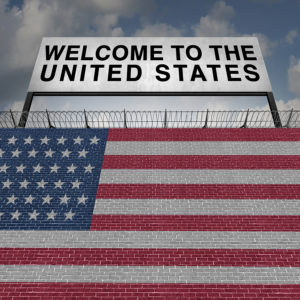DelVal Dems Oppose Border Security Bill

Republicans want it. Democrats hate it. President Joe Biden has pledged to veto it. And the Delaware Valley’s congressional representatives don’t want to talk about it.
The U.S. House of Representatives will vote Thursday on a major border security bill—H.R. 2—that will very likely die a swift death in the Senate but will serve as a reminder of the country’s ongoing and escalating border crisis. The bill passed its final hurdle before a floor vote when Republicans, including Bucks County’s Rep. Brian Fitzpatrick, joined the rest of his party in advancing the legislation.
“Extreme House Democrats have embraced the chaos on the southern border, allowing deadly drugs and violent criminals to flow into our country. Pennsylvania Democrats’ refusal to keep families safe is dangerous and disqualifying,” said National Republican Congressional Committee spokesman Chris Gustafson.
The Biden administration on Thursday is set to formally end the pandemic-era Title 42 policy. It allowed the swift expulsion of illegal immigrants on the grounds of public health. The Trump-era policy has been used more than 2.8 million times since the beginning of the COVID-19 emergency.
H.R. 2 is meant, in part, to address what is expected to be a massive flood of migrants entering the country in response to that program’s end.
The bill would order construction of the southern border wall to resume. It would increase enforcement personnel at the border and enact new restrictions on asylum seekers. It would clarify federal policies on family immigrant detention and restrict funding “to any nongovernmental organization that facilitates or encourages unlawful activity, including unlawful entry.”
None of the Delaware Valley Democratic representatives in Congress—Chrissy Houlahan, Mary Gay Scanlon, and Madeleine Dean—responded when asked about their thoughts on the bill and their intended votes on it. They all voted against allowing it to come to the House floor.
Fitzpatrick, on the other hand, was a co-sponsor of the Public Health and Border Security Act of 2022, a measure that would have prevented Biden “from lifting existing Title 42 immigration restrictions without a plan in place …to address the expected surge of migrants at the Southern border.”
“I’ve witnessed firsthand the threats our nation faces from a porous border and a fragmented immigration system,” Fitzpatrick said at the time, calling for “a workable plan that will ensure the humane treatment of migrants and keep our border and neighboring communities safe and secure.”
Scanlon this week directly addressed the upcoming immigration bill, writing on Twitter: “Pennsylvanian families and businesses are demanding fixes for our broken immigration system. Democrats are ready to work with Republicans on common sense, long-term solutions, but we will never agree to cruel and unworkable policies like their latest immigration scheme.”
At a House Judiciary hearing in February, meanwhile, Dean argued that Republicans “want the American people to be scared” of the reported crisis at the southern border. Like her fellow Democrats, Dean opposes deporting illegal immigrants simply for being in the U.S. illegally.
“The reality is, there is no ‘invasion,’ there are no ‘hordes of invaders,’ our borders are not being overrun by dangerous criminals,” she argued. “But we do have a broken immigration system.”
Dean acknowledged the U.S. is “suffering with an extraordinary drug problem” in the form of fentanyl, much of which comes across the border from Mexico. But she suggested the problem isn’t found among the huge streams of migrants crossing at porous border points.
“Ninety percent of fentanyl, heroin, and meth seized in this country is captured at ports of entry,” she said. “This means the drugs are being brought in through normal channels, not on the backs of families crossing at remote parts of the country.”
And on her website, Houlahan stated she “believe[s] strongly in secure borders – land, air, and sea.”
“We have the honor and duty of upholding our American values as we strive to implement immigration policy that centers on compassion, fairness, and national security,” she said. “What is happening at our southern border should alarm all of us.”
On Wednesday, Secretary of Homeland Security Alejandro Mayorkas announced in a press conference a newly finalized federal rule that would allow the U.S. to “remove individuals who do not establish a reasonable fear of persecution in the country of removal.”
Noncitizens can establish criteria “if they have used our lawful pathways,” Mayorkas said, or “sought asylum or protection in another country through which they have traveled and were denied.”
Asked by reporters Wednesday if he believes the border is in crisis, Mayorkas declined to respond. He has repeatedly claimed that “the border is secure.”
Videos of the border show tens of thousands of undocumented migrants preparing to pour across the U.S. border, where most will be allowed into the U.S. and given a date to appear for a hearing.
Todd Bensman with the Center for Immigration Studies is at the border in Matamoros, Mexico, and reported “thousands of migrants flooding into the U.S. all day Wednesday. They are not waiting for the end of Title 42. Mexican immigration officials on the ground are powerless to do anything.”
In a policy statement this week, the White House said it “strongly supports productive efforts to reform the Nation’s immigration system but opposes H.R. 2.”
“If the president were presented with H.R. 2,” the statement said, “he would veto it.”





